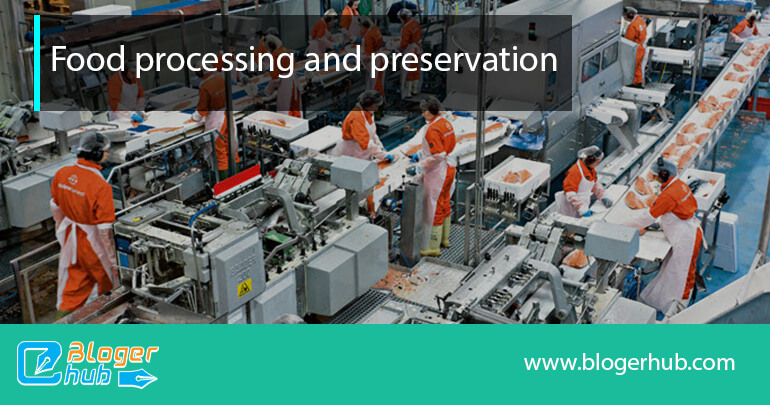We are familiar of food processing and preservation as we eat processed food also preserves it for the future use. Food processing is basically transforming the agricultural products into food, as well as changing the form of a food to the other, making it attractive marketable products with good packaging, cleaning, grading and sorting. And food preservation is applying techniques to preserve food for future including freezing, canning, pickling, drying, irradiation, smoking, pasteurization and adding chemicals etc. Without proper preservation techniques, we risk running into food shortages in the future.. So preserving food is very important.
Contents
Food processing and preservation refer to the techniques used to transform raw ingredients into safe, stable, and nutritious food products while extending shelf life. From ancient methods like sun-drying to modern innovations like vacuum packaging and irradiation, these practices are crucial in today’s global food system.
In 2025, food preservation isn’t just about keeping food longer—it’s about reducing waste, increasing access, and maintaining nutritional value across diverse regions.
Modern food systems rely on processing to meet demands of urbanization, busy lifestyles, and food security challenges.
Key benefits of food processing:
Example: Packaged milk undergoes pasteurization, improving shelf life while retaining nutrients.
Understanding common methods helps consumers appreciate how food stays fresh and nutritious.
| Method | Description | Example |
|---|---|---|
| Thermal Processing | Use of heat to kill microbes | Pasteurized milk |
| Mechanical Processing | Cutting, milling, grinding | Flour milling |
| Chemical Additives | Preservatives and antioxidants | Pickles, jams |
| Biological Fermentation | Using microbes for transformation | Yogurt, kimchi |
| Irradiation | Gamma rays for sterilization | Dried spices |
Preservation prevents spoilage and retains quality for a longer duration. Popular techniques include:
New technologies are transforming the food industry:
These innovations reduce reliance on artificial chemicals and ensure better food quality and safety.
In developing countries, 30–50% of food is lost due to poor storage. Preservation plays a key role in:
Example: Cold storage hubs in India have reduced fruit spoilage by 25%.
👩🔬 Careers in Food Processing Industry
This booming industry opens the door to high-demand careers in 2025:
Tip: Explore our article on High CPC Keywords for Bloggers in 2025 to learn how food tech topics can also be monetized!

Well, food processing removes the harmful substances and inedible portions and save it for a long time. By food processing, we can enjoy the food at anywhere and in any season we want. Exporting it also brings valuable foreign exchange and opportunity comes for the import substitution. It is a great source of employment too as it benefits many people like the farmers, vendors and the packaging suppliers. It also decreases the price of food like, vegetables that are frozen have the same nutrition value as the fresh ones but it can be bought at lower price as it was preserved without the inedible parts. Thus it extends the shelf life of food and reduces the amount of waste.
Verities of food can be enjoyed in any season we want by food preservation and the supplement can be increased also the waste of food can be reduced in the process as the excess food can be preserved so there’s no wastage of food at all. If food preservation is done in the right way, the nutrition value can be kept and no harm can occur. Food preservation increases shelf life by keeping food fresh for longer. It also decreases the dietary inadequacies by import and export by overcome the shortcomings where it’s needed. It adds variety to the diet.
Modern science has greatly enhanced food preservation techniques to improve both safety and efficiency. Technologies like vacuum drying, high-pressure processing (HPP), and ultraviolet (UV) radiation are increasingly used to kill bacteria and extend shelf life without altering nutritional value.
Biopreservation—the use of natural microorganisms or antimicrobials—has become a promising area in preserving perishable foods without chemicals. Similarly, smart packaging technologies now monitor freshness and temperature to ensure food safety during transportation.
Scientists have developed innovations that reduce foodborne illnesses, preserved quality, and allowed for safer international food distribution.
Governments and food industries use food processing and preservation to ensure food security.:
In developing countries, affordable preservation techniques like solar drying or low-cost canning help combat hunger and malnutrition. Preserving surplus food during harvest seasons ensures it’s available during scarcity, improving resilience in food systems globally.
The food processing and preservation industry offers a wide range of career opportunities across sectors like manufacturing, quality control, research, packaging, logistics, and food safety.
Some popular roles include:
With the growth of the food industry and increased demand for safe and long-lasting food, skilled professionals are highly sought after. Students with degrees in food science, biotechnology, or chemical engineering have significant opportunities in this expanding global industry.

We all are aware of the some harmful aspect of processed foods that are not good for our diet that’s because of the way of food processing but it can be solved if those particular food process is changed and altered by something that has no harmful impact on our health. Rather than few of those facts, food processing and preservation is essential for us nowadays and we have been so dependent to it but of course it needs to be balanced because excessive anything can have harmful effects. We should be concerned enough about the whole process to solve any issue regarding it as our health is of a supreme importance to us no matter what.
Food processing involves converting raw ingredients into consumable food through methods like grinding, milling, cooking, or packaging.
Food preservation, on the other hand, focuses on extending the shelf life of food using techniques like refrigeration, canning, drying, or adding preservatives.
Food processing improves the safety, taste, texture, and shelf life of food. It helps remove inedible parts, destroys harmful microorganisms, and allows for mass production of food products. It also helps in reducing food waste and enables global food distribution.
The most common food preservation techniques include:
These methods prevent spoilage, extend shelf life, and maintain nutritional value.
Yes, properly preserved foods are generally safe. However, overuse of chemical preservatives can be harmful. It’s important to follow safety standards and opt for natural preservation methods like freezing or drying when possible.
Yes, food processing can both increase and decrease nutritional value. For example:
It depends. Efficient food processing and preservation can reduce food waste and lower carbon emissions from spoilage. However, excessive packaging or reliance on chemical preservatives can harm the environment. Sustainable practices like biodegradable packaging and solar drying are more eco-friendly.
[…] us as we uncover the intriguing history and exciting future of food processing. Get ready to explore the transformation of our food from its origin on the farm to the table in […]
[…] delve deeper into this multifaceted phenomenon, exploring some key that showcase the magic of food processing […]